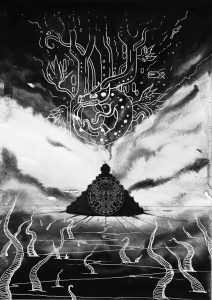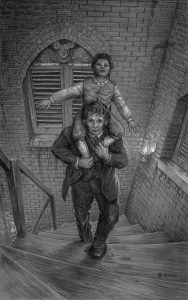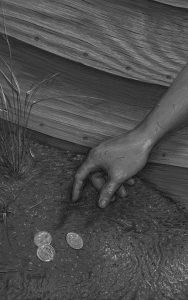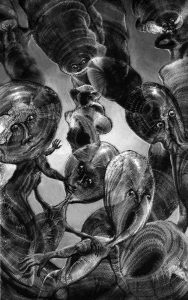Despite our intent to drift on to other topics, we have too much booky stuff yet to cover – so here’s a quick mention of two brand new things old greydog has edited. But for relief, we do also have the next three parts of Alan M Clark‘s short novella, which we’re serialising.
Two buses turned up at once yesterday – the latest issue of Occult Detective Magazine (#7), edited by John Linwood Grant & Dave Brzeski (Cathaven Press, 2020), and the first volume of Sherlock Holmes and the Occult Detectives, edited by JLG (Belanger Books, 2020).

Utilising our slick patter and proven promotional techniques, we suggest that, uhh, you have a look and buy them if you fancy them. A compelling argument, we think.
Occult Detective Magazine #7 is packed with brand new stories, reviews, articles and art – we have horror from Guyanese folklore, and the tale of a sangoma in Southern Africa; a Mayan investigator, a Japanese priest, and a half-Punjabi psychic, plus Aleister Crowley in London and horror in the United States. In print now on Amazon UK and US, Kindle to follow.
Sherlock Holmes and the Occult Detectives Volume 1 offers you Van Helsing hunting the Whitechapel Murder, and a mystery for Mary Morstan. Irene Adler’s daughter asks for help; a dark community is discovered in the Welsh hills; there is Russian murder and espionage, and Holmes debates with Dr John Silence. 350 pages of period mysteries, puzzles and horrors. Print and Kindle on Amazon UK and Amazon US, Volume Two to follow.
Right, on to more of Alan’s spooky period novella…
N.B. For segments 3,4 & 5, see http://greydogtales.com/blog/mudlarks-part-two/
or see the full story unfolding daily here:
https://ifdpublishing.com/blog/f/mudlarks-and-the-silent-highwayman
MUDLARKS AND THE SILENT HIGHWAYMAN
SEGMENT 6
“If Papa were here—” With the thought of his father, anger welled up in Albert, cutting off his words.
The strain lifted from Mum’s features for a moment. “He would give me that smile of his,” she said in a wistful, dreaming voice. “Oh, how he could grin.”
Papa had used his winning smile on her every time she caught him in a lie or he failed to do his part and disappointed her.
Albert Gladwick senior had been a good father before he went off to the war. Young Albert recalled that on his seventh birthday he and Papa had made a climb into a church tower to get above the incessant coal smoke haze and view the stars. His father had carried him most of the way up on his shoulders. On that magical night, they’d seen green wisps of the northern lights. “Rare, that is,” Papa had said with a warm smile, “a gift given only to good boys.”
At present, Albert remembered that event as the happiest moment of his life.
Because watermen had many of the skills required to crew ships—knowledge of piloting among currents, anticipating tides, and dealing with changes in weather—the Royal Navy had pressed many of them into service during the Anglo-Egyptian war, Albert Senior among them.
If Papa had died in Egypt, Albert thought, at least I’d have the memory of who he’d been. He made that all a lie.
Missing a leg, mustered out of the Royal Navy with no pension, and tormented by experiences of which he spoke only cryptically, Papa had become a bitter, broken man, good for nothing. He could not go back to work on the river. Young Albert had done for him while Albert senior drank away the household funds. In addition to the charring work she did by day, Mum had taken to selling matches, flowers, and pencils on the street at night to help keep the family fed. Some nights she’d be out until dawn, trying to earn.
“Common tail, you’ve become,” Papa said one morning when she came home. “I know how you earn. Don’t try to tell me different.”
He raised a hand to strike her and young Albert grabbed his wrist. Albert senior wrenched the hand loose and backhanded him with it. The boy fell, struck his head on the bed rail, and began to cry.
“If you were my son,” Papa said, his sweating, unkempt face a fright to look upon, “you wouldn’t weep so easily.”
Albert ceased to cry, and stared at his father’s crazed features, not understanding.
Papa had a brief look of shame, said sadly, “You’d be better off if I crossed the river.” Then he’d fled the room.
That had been over a year ago. Papa had never come back.
Albert didn’t look for his father in South London. He didn’t think the Thames was the river he’d meant.
If Papa still lived, having but one leg, his prospects were poor. If he’d been whole, Albert could have imagined all sorts of reasons for his disappearance. Men went missing from London all the time. No, if Papa had not died, he’d become lost on the streets or somewhere in the relief system.
Albert’s sadness for the loss of his father had slowly turned to anger.
What had he meant to say to Mum about Papa? “If he were here, willing to do his part…,” Albert began anew.
“The illness will pass,” Mum said with a stern look.
He knew that if Albert Gladwick senior stood before them in that moment, she would defend him and his worst deeds, still smitten as she was with his smile.
In his disgust at the thought, Albert nearly walked out to return to the wherry.
But then Mum looked him in the eye, said, “I have you, and you’re a good boy. You have done your best to look after me, better than I’ve done for you.”
With her words and the warmth in her eyes, he felt like a grown man, capable and honorable, a good feeling in the hard world in which he found himself.
No, he could not leave his Mum in her time of need.
Near dusk, Albert realized he’d lost an entire day that could have been used to salvage from the wherry. He fought with himself, finding his unwillingness to abandon his mother unreasonable. Still, he could think of no falsehood that would give him the time he needed to do the work at the river. Even though making his salvage from the wherry would help Mum too, he couldn’t bring himself to admit to her that he’d been lying about how he made his earnings. On his third trip that day from their lodgings to the public pump to fetch a bucket of water, he almost abandoned the errand to go to the river. Darkness had crept up on him, and he decided as he had before that the light necessary to work at the wherry would only bring unwelcome attention to the wreck in the night.
Returning to the dimly-lit interior of their room, he nearly tripped over the heavy porcelain chamber pot resting in the middle of the thin walkway between the bed and the table. The pot, rather full, needed dumping again. Tiny flecks of white swirled about in the colorless waste within.
His mother had returned to bed.
Albert placed his bucket on the open central shelf of the corner hutch, dipped water from it into a cup for Mum, and set the cup on the bedstead. Lifting the brimming chamber pot, he carefully took the vessel out and poured the fluid into the privy vault. He’d already performed the chore six times that day.
Returning to the room, he found Mum inclined in the bed, drinking from the cup he’d filled for her. Much of the liquid spilled down her stained nightshirt. Although constantly thirsty, she’d had no appetite since falling ill. Her retching produced little but a clear liquid.
“I’m hungry, Mum,” Albert said, hoping she’d send him out for food. If she did, he’d have the excuse to visit the wherry, perhaps cut a few rushes from elsewhere along the foreshore to throw atop the vessel to help keep it hidden. If he ran the whole way there and back, she might not miss him. He might even have time to stop in the marine store to sell the linen cloth.
“Bit of toke,” Mum said, her words gummy from lack of spittle. She gestured toward the upper cabinet of the hutch where she stored the edibles.
Resentfully—he felt little hunger, despite his protestation—Albert found and ate the crust that remained of a loaf of bread, the last bit of food in their room.
Not long after dark, he began to suffer a severe loosening of the bowels, with a thin, watery discharge. He tried not to think that he would soon find himself in the same condition as his mother. During a lull in the seemingly endless evacuation, he donned his nightshirt, got in the bed on the side next to the wall, and lay down beside Mum.
MUDLARKS AND THE SILENT HIGHWAYMAN
SEGMENT 7
Albert found a fitful slumber. He tossed and turned through much of the night. During a dream of scavenging the wreck of the wherry, he knew himself to be partly awake. In that half-dream, he found beautiful porcelain, and a shilling amidst the silt near the boat’s prow. He seized upon that vision of discovery, reliving it several times in an effort to give substance to the hope it seemed represent. Each time the discovery was a little different; the porcelain became table silver; the single shilling became two, then the coins became gold sovereigns.
A rumbling gut and a memory of something Papa had said about gold brought him fully awake for a moment. Albert turned to face the wall as he remembered. His father had been drunk and ranting angrily. “Gold has no worth but what the fancy of men give it. Those in the upper classes, though they have the advantage, they are not truly our betters.”
What an odd notion, Albert had thought at the time. Must be the drink—everyone knows gold is valuable.
Returning to his half-dream, he saw George Hardly approaching the wreck. Albert crouched down among the rushes, fearing he might have been seen. He scooped up a handful of mud to throw at Hardly if necessary, and held his breath, watching silently. The older boy seemed unwilling to look directly toward the area of the white lead works drain. He gave it a wide berth and moved on along the curve of the muddy foreshore.
Albert plucked the coins— now three gold sovereigns—out of the silt near the prow of the wherry, placed them in the hidden pocket inside the buttoned waistband of his breeches, and hurried away.
Half awake, he knew the vision to be pure fancy. Still, the sense of hope it gave allowed him to ignore the misery of his situation.
Since his mother no longer made an effort to keep from fouling the bed, Albert also allowed himself to let go his bowels as he lay there. He would help Mum clean the mattress ticking and stuff it with fresh straw later. For a short time, he found deeper slumber.
~ ~ ~
Fully awake at last as morning light entered the sooty window of their lodgings, Albert rocked in the damp, chilly bedclothes, unable to gather the will to rise. Finally, the wetness beneath him and the malodorous night air in the bed drove him to his feet. Although he felt worse than he had the night before—truly wrung out—Albert had to find his strength. With Mum down with illness, providing the daily victuals fell to him.
Again, he thought resentfully of his father.
Even if he were about, he’d be no help. Good riddance.
Mum remained asleep, lying on her back. She slept so peacefully, even her usual soft snoring had ceased. Her lower left leg hung over the edge of the mattress. Albert lifted the stiff gray limb and placed it back in the bed. Her skin felt cold to his touch. Trying not to disturb her for fear that she’d keep him from leaving, he pulled the untidy bed clothes over her, tucking them up around her shoulders and down around her dry feet.
A hollow ache in his gut told him to eat, but they had nothing left. Just as well—he had to make his salvage, sell what he could, hopefully earn enough to buy some meat or fish. He would eat later.
His muscles moving with reluctance, Albert removed his sodden nightshirt and dressed himself for the day. Fluid ran down his legs and into his shoes as he opened the door. Thinking of the embarrassment he would experience if anyone saw he’d wet his breeches gave him little pause. He stepped from the lodgings and staggered along Narrow Street, then south on Bridge Road.
MUDLARKS AND THE SILENT HIGHWAYMAN
SEGMENT 8
The Thames had made Albert ill again. Even as he struggle to return to the water’s edge, he bore the shame of having brought the sickness from the river to Mum as well.
Common wisdom said that illness came from bad smells, those of the river and the night air of privies and the countless other places of rot and decay. Some said that illnesses didn’t come from bad odors and instead from creatures in the water so small they couldn’t be seen. Albert’s few attempts to imagine such beings, were not frightening enough to be believable.
He might have blamed the grundylows, but had somehow decided they were pure make-believe.
No, the sickness is the Silent Highwayman’s doings, he thought, trying unsuccessfully to cast aside his feeling of guilt.
A few who saw him struggling along the street gave concerned looks, yet nobody stopped to ask after his welfare. He didn’t expect any attention or help. So many children wandered the streets, ragged, ill, neglected, and unwanted. At least he had his Mum.
Albert passed the Limehouse Basin, crossed over two locks, took a right into Cuba Street, headed for the West India Docks Pier.
With little distance to go before reaching the path that led down to the water’s edge, he heard, “Little boy!”
The voice came from behind him. He twisted his stiff neck around to see George Hardly emerging from between two warehouses about a hundred yards away.
Albert hurried forward, his throat clenching on dryness as he tried to swallow, the pulse in his throat suddenly rapid, his head clearing even as he felt a separation from his body.
“Where are you going?” Hardly shouted. “Stop, or you’ll be sorry.”
The sound of rapid footsteps came from behind.
Having taken that trek so many times in recent days, Albert was able to move in an unthinking manner, somehow keeping his frantic feet under him. He dreaded the twenty-foot climb down the steep embankment beside the pier almost as much as he feared George Hardly catching up. If he got to the water, he might hide among the stumps of old pilings beneath the pier.
A group of laborers parted to allow Albert to stumble past on the footway. Shortly after, Hardly’s rapid steps ended abruptly and with a short outburst, as if bodies had collided.
“You want to take more care,” someone said in anger.
“Out of my way,” came Hardly’s voice.
“He’s got a knife!” came another voice.
“Yeah, but it’s such a little one,” came a third, with a scoffing chuckle.
Albert didn’t look back. Where the cobblestones of Cuba Street ran out, he dodged to the left around the iron pier, slowed, and started down the eroded bank seam.
“Let me by,” Hardly shouted, then came the sounds of a scuffle and a sharp cry.
Albert tried to take more care with his steps. Some of the loose granite cobbles of the road had tumbled partway down the steep incline and become wedged in the seam long ago, providing footholds. Albert put his weight on one and it gave way. He rolled sideways, hit the rough dirt to his left, and tumbled forward ten feet through the air.
Landing headfirst on the dense sand at the river’s edge, he heard a loud crack in his neck and shoulder, and the world around him lost some of its color, everything going gray as he became still.
The full Mudlarks book itself, illustrated throughout by Alan, is available now on Amazon, and directly from the publisher through the links below:



